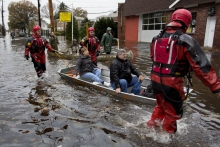Climate change could lead to global conflict

Other countries have also experienced extreme weather events over recent months. Australia has just had its hottest year on record, during which it suffered record-breaking heatwaves and severe bushfires in many parts of the country.
Argentina had one of its worst heatwaves in late December, while parts of Brazil were struck by floods and landslides following record rainfall. And very warm surface waters in the north-west Pacific during November fuelled Typhoon Haiyan, the strongest tropical cyclone to make landfall anywhere in the world, which killed more than 5,700 people in the Philippines.
This is a pattern of global change that it would be very unwise to ignore, says Stern, author of the 2006 report on the economics of climate change.
The Intergovernmental Panel on Climate Change last September has concluded from all of the available scientific evidence that it is 95% likely that most of the rise in global average temperature since the middle of the 20th century is due to emissions of greenhouse gases, deforestation and other human activities.
If we do not cut emissions, we face even more devastating consequences, as unchecked they could raise global average temperature to 4C or more above pre-industrial levels by the end of the century.
This would be far above the threshold warming of 2C that countries have already agreed that it would be dangerous to breach. The average temperature has not been 2C above pre-industrial levels for about 115,000 years, when the ice-caps were smaller and global sea level was at least five metres higher than today.
The shift to such a world could cause mass migrations of hundreds of millions of people away from the worst-affected areas. That would lead to conflict and war, not peace and prosperity.
Read the full article in The Guardian.

